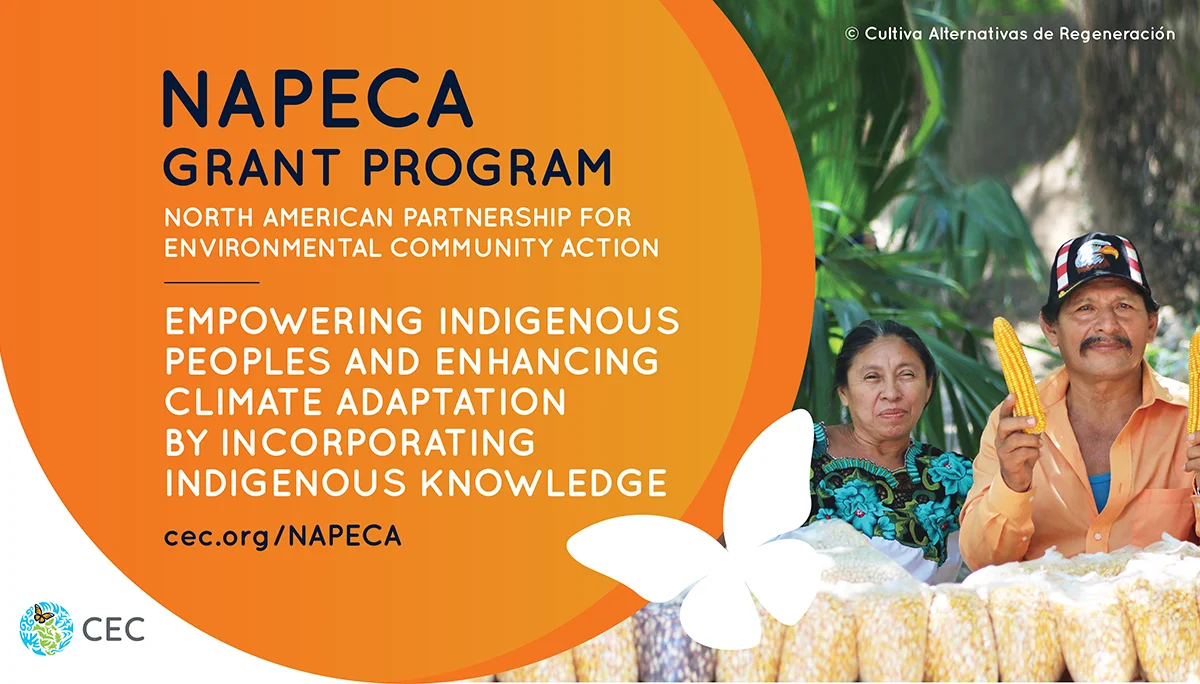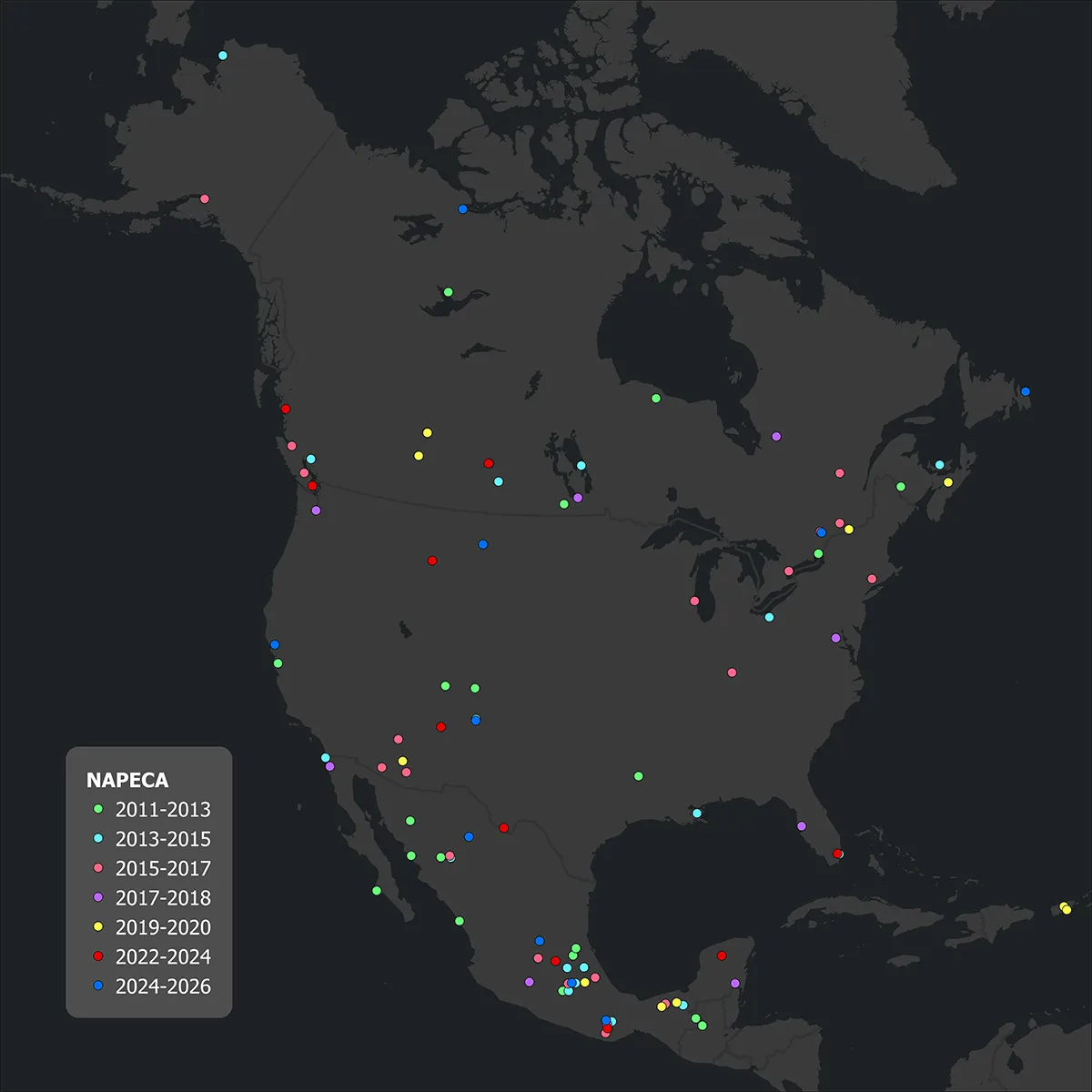What is NAPECA?
The CEC established NAPECA to promote shared responsibility and stewardship for the environment by engaging and partnering with tribal nations, Indigenous Peoples and communities, including Indigenous governments, councils and organizations, local communities, academia and registered nongovernmental organizations in Canada, Mexico and the United States.
Since 2010, NAPECA has been instrumental in fostering collaborative efforts to address pressing environmental challenges while promoting sustainable development and fostering cross-border cooperation. Through NAPECA, the CEC encourages model environmental initiatives that will help build long-term partnerships to improve environmental conditions at the community level and support local priorities.
Empowering Indigenous Peoples and Enhancing Climate Adaptation by Incorporating Indigenous Knowledge
Given their thousands of years of experience conserving and managing the environment, Indigenous Peoples and communities have invaluable knowledge systems and practices that contribute to the sustainable management and preservation of resources and can help with meeting environmental challenges, including the climate change crisis.
The last NAPECA grant cycle aimed to support climate adaptation in North America by engaging and empowering communities, particularly Indigenous and local communities, in applying Indigenous Knowledge to strengthen community-based resilience to climate change. The CEC received proposals from organizations to support environmental initiatives that will help North American communities enhance climate adaptation by working with Indigenous Peoples and local communities to recognize, apply, and protect traditional and Indigenous knowledge systems.
Results of the NAPECA Grant Program
The seventh cycle of the NAPECA grant program concluded with the selection of 10 grant recipients representing a range of communities in Canada, Mexico, and the United States. The 2024-2026 cycle supported environmental initiatives that help North American communities enhance climate adaptation by working with Indigenous Peoples and local communities to recognize, apply, and protect traditional and Indigenous knowledge systems.
Learn more about previous NAPECA grant recipients and their projects.
General concepts
Because Indigenous Peoples live in different environments and contexts specific to their countries, regions and histories, three definitions of Indigenous Knowledge that reflect diverse North American perspectives are proposed.
Definition by the Government of Canada1:
There is no single definition of Indigenous Knowledge. For our purposes, we understand “Indigenous Knowledge” as a term that refers to a set of complex knowledge systems based on the worldviews of Indigenous Peoples. Indigenous Knowledge reflects the unique cultures, languages, values, histories, governance and legal systems of Indigenous Peoples. It is place-based, cumulative and dynamic. Indigenous knowledge systems involve living well with, and being in relationship with, the natural world. Indigenous knowledge systems build upon the experiences of earlier generations, inform the practice of current generations, and evolve in the context of contemporary society.
Definition by the Government of the United States2:
Indigenous knowledge (hereafter, TEK) refers to the evolving knowledge acquired by Indigenous and local peoples over hundreds or thousands of years through direct contact with the environment. This knowledge is specific to a location and includes the relationships between plants, animals, natural phenomena, landscapes and timing of events that are used for lifeways, including but not limited to hunting, fishing, trapping, agriculture, and forestry. TEK is an accumulating body of knowledge, practice, and belief, evolving by adaptive processes and handed down through generations by cultural transmission, about the relationship of living beings (human and non-human) with one another and with the environment. It encompasses the world view of Indigenous Peoples which includes ecology, spirituality, human and animal relationships, and more.
Definition by the Government of Mexico3:
Indigenous knowledge refers to bodies of knowledge, values, understandings and interpretations that constitute complex systems, closely related to the world views, territories, natural resources or assets of Indigenous Peoples and communities; …collective in nature; …acquired, inherited and practiced over the time and the spaces inhabited, and handed down through generations, in accordance with their own normative systems. It is the product of experiences, studies and practices within the community, comprehensive and interconnected, spanning various aspects of the lives of individuals and of a community, and forming part of the cultural heritage of Indigenous Peoples and communities as elements of their identity—therefore dynamic and constantly evolving, yet with collective property rights. This knowledge, sometimes shared with other peoples and communities, plays a critical role in decision-making and is essential in the development and the future of Indigenous Peoples and communities.
2 https://www.fws.gov/sites/default/files/documents/TEK-Fact-Sheet.pdf and https://www.whitehouse.gov/ostp/ostps-teams/climate-and-environment/indigenous-knowledge/
3 Definition provided by the Instituto Nacional de Pueblos Indígenas de Mexico (INPI)
- The United Nations Declaration on the Rights of Indigenous Peoples
- “Free, prior and informed consent”, https://www.fao.org/3/i1857e/i1857e.pdf, p. 5

